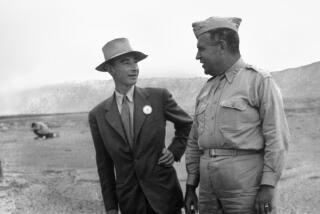A Fusion of Nuclear Factions : Government: U.S. energy secretary sponsors meeting of scientists and adversaries in campaign for openness. She is advocating release of Cold War data.
- Share via
SAN FRANCISCO — The scene Tuesday morning was a sign of the changing times: As Edward Teller, the father of the hydrogen bomb, watched, the nation’s top energy official walked over and hugged an anti-nuclear activist.
For Energy Secretary Hazel O’Leary, who has shaken the nation by releasing details of secret radiation experiments on unknowing subjects, it was a moment that symbolized her effort to bring a “culture of openness” to government.
O’Leary, going on the road with her campaign to declassify the secrets of the Cold War, convened the unprecedented meeting Tuesday of leading nuclear scientists and longtime nuclear opponents. O’Leary asked for support from, among others, a Catholic priest who has been arrested 35 times for protesting nuclear research at the Lawrence Livermore National Laboratory.
She expressed her sympathy to a victim of government radiation poisoning, saying: “In so many ways we are all victims. We are also victims of our mistrust of one another.”
And responding to a request from anti-nuclear activists, the secretary said she would immediately ban the shredding of any classified documents while the search is under way for additional evidence of improper radiation testing.
The meeting in downtown San Francisco was the first of at least three public forums designed to help the Department of Energy shape its policy for declassifying about 32 million pages of documents on nuclear research.
In addition to documents on human experiments and nuclear testing, the department is attempting to declassify information on annual plutonium production rates, the size of the nuclear arsenal and hundreds of other sensitive issues.
Privately, Energy Department officials hope the forums will help generate public support for declassification and neutralize opposition from an entrenched bureaucracy within the department that resists opening its files.
“Some have said this is a PR effort,” O’Leary said. “It’s not. This is about our future. It’s about the survival of a nation. It’s about the survival of our children.”
Among the scientists who spoke at Tuesday’s forum were the 85-year-old Teller--who helped persuade President Ronald Reagan to push forward with the Star Wars defense program--and officials from Stanford Linear Accelerator and the Lawrence Livermore lab, one of the nation’s two nuclear weapons research facilities.
Most of the scientists were supportive of the idea of declassification, saying it would aid industrial growth, energy development and the negotiation of arms limitation treaties with other nations.
But Teller, who was an early advocate of reduced secrecy in nuclear affairs, cautioned that recent reports about Cold War experiments on unknowing victims have overstated the harm that was done.
“I think that human experiments without the consent of the people is wrong,” he said. “I also believe that the actual damage that has been done has been grossly exaggerated.”
After more than a decade of criticizing the government from the outside, anti-nuclear activists were surprised to find themselves in the same room with Teller--their archenemy--and other nuclear experts.
At one point, activist Anne Herbert noted that she wrote the widely circulated slogan, “Practice random acts of kindness and senseless beauty” and praised O’Leary’s campaign for government openness.
“I can’t believe being inspired by the person who is in charge of Los Alamos (nuclear weapons research facility),” Herbert said.
O’Leary, who was standing a few feet away, came over and gave her a hug saying, “Can I give you a random act of kindness?”
Although they say they are impressed with O’Leary and are pleased to be courted, some opponents of nuclear weapons remained skeptical that the secretary can overcome the Energy Department’s bureaucracy and nearly 50 years of entrenched secrecy.
“I hope she can do it,” said Jackie Cabasso of the Western States Legal Foundation. “But I hold on to a healthy dose of skepticism.”
More to Read
Sign up for Essential California
The most important California stories and recommendations in your inbox every morning.
You may occasionally receive promotional content from the Los Angeles Times.













